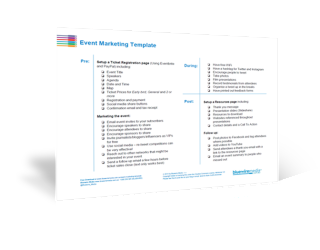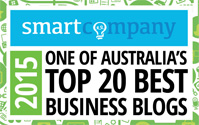How to Market an Event Online [Step-by-Step]
![How to Use the Event Marketing Template [Step-by-Step]](https://www.bluewiremedia.com.au/wp-content/uploads/2016/06/How-to-Use-the-Event-Marketing-Template-Step-by-Step.png)
If you’ve ever produced events, planned a workshop, or volunteered at an event, you probably have an idea of the massive amount of preparation that goes into them.
But how much time do you think goes into marketing these events online?
Event planning is not for the faint of heart. It takes strategy, patience, flexibility, and a considerable budget to pull off a successful event that is well attended.
And if you ARE going to invest all that time and money into an event, don’t you want to make sure it’s a winner?
A well planned event thinks about the journey of an attendee much like the journey of a customer. Before they know about the event, while they are experiencing the event and after they have attended the event – these all need to be considered in how you market your event online.
A good event planner recognises that in order to drive attendance and engagement, they need to cover all of their bases when it comes to marketing the event – through email, an effective social media strategy, and a well integrated web presence.
In fact on average, companies use 5 different methods of event promotion, and email is the most widely used online channel.
So if you’re thinking about running an event, and want some guidance on how to market it online, our Event Marketing Template is a great place to start. The Event Marketing Template will help you effectively market your next event on the web with tactics before, during and after the fact that will improve your return on investment.
It has been downloaded tens of thousands of times as a part of our 33 Web Marketing Templates – if you don’t have a copy you can download one below.
Table of Contents
Where Do You Start?
Before The Event
Marketing The Event
During The Event
After The Event
What Next?
Where Do You Start?
So let’s start at the top. First, you’ll want to think about your goals for the event. Some things to consider:
- How many people would you like to attend the event?
- Are you covering costs for the event with ticket sales?
- What is the purpose of the event? – Promoting your company’s service or new offer? Networking for company executives? Exposure for your brand? Partnerships in your industry?
- Who is your target audience – who would you like to see at the event?
This will help to give you some benchmarks for event success, and will determine the emphasis and structure for how you promote your event online.
Next, you’ll want to take some time to consider what resources you have for marketing your event.
- Do you have a budget? How much can you allocate for marketing?
- Do you have speakers or influencers in your audience who could help with promoting the event?
- What online platforms are available to you for event marketing (Facebook, Twitter, your blog etc.)?
Finally, keep a checklist/timeline of everything that you’ll need to execute the event – from planning and promotion to vendor payments and ticket registration.
When it comes to marketing the event online, we’ve got you covered with this extensive checklist and template for getting the word out.
Let’s jump in…
Before The Event
So, you’ve set the date and at least know what your event is going to be about (hopefully). Time to set up a ticket registration page!
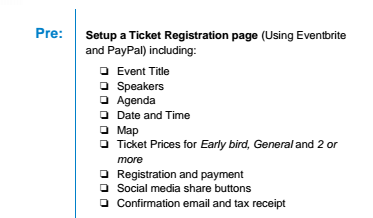
Eventbrite is the industry leader in event ticketing and registration. “Since 2006 Eventbrite has ticketed over 150,000 festivals globally, more than 50,000 of which came in 2014 alone,” according to a report from Forbes.
No matter what the size of your event, Eventbrite has you covered when it comes to selling tickets and registering your attendees.
In order to set up an event page and the registration for the event through Eventbrite, you’ll first need an account. Once you’re set up there, you can start creating your event page.
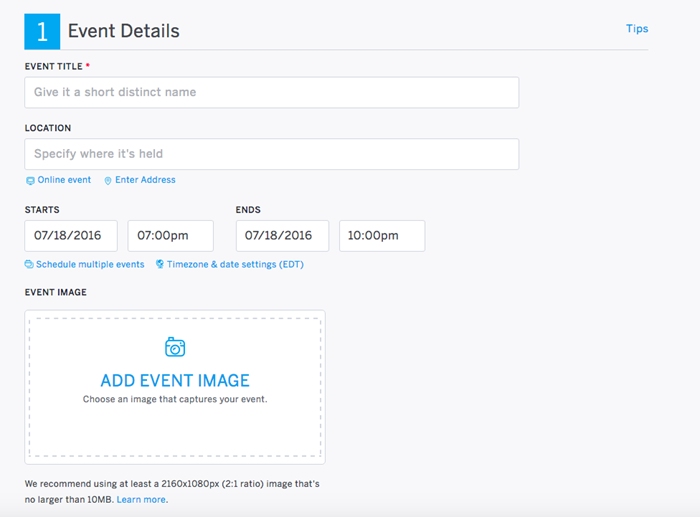
If you have all of your event details nailed down, publishing your ticketing registration page on Eventbrite shouldn’t take more than a few minutes.
You’ll need the following information:
- Name of the event
- Date and time of the event
- Event location
- Pricing information for your tickets
- A description for the event
- The event agenda/schedule
- Any details about your company and the speakers or event sessions that you want to promote
- Links to your website, social media channels, and any event-specific links that you want to include
- Any details about the event that attendees might ask about – Directions to the event, parking information, suggestions about what to wear to the event, if food will be provided, if childcare is available, etc.
If your event is free, there is no fee for setting up an Eventbrite page.
If you are charging for tickets, Eventbrite charges a fee per ticket, and a payment processing fee if you use their system for payment processing.
You can pass on some of these costs to your attendees, and if you’d like to use a service like PayPal for payment processing, that’s also an option.
The Eventbrite platform also makes it possible to share and promote your event, and offers support for registration issues – there’s a mobile app to help with registration and ticket sales too. If you have any other questions or issues, the Eventbrite Help pages will usually answer any technical questions you have about setting things up.
Ultimately, you’ll want to make sure that your event page captures everything an attendee might need for purchasing tickets and getting to the event.
Marketing The Event
Now let’s get the word out about the big day.
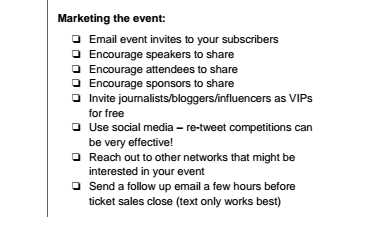
We mentioned it before, but email is the most widely used source for event promotion. But you’ll want to make sure that the email invitation doesn’t disappear in an inbox. Carefully consider your email subject line, and craft an invitation that people will want to look at.
Include the MOST pertinent information about the event – smaller details (like parking information) isn’t necessary just yet. The first email that you send out should let them know when and where the event is, and that you’d love to see them there. A big name speaker is a good detail to include, along with a prime event location.
Make potential attendees feel like they NEED to be there. A few tips on encouraging their ticket purchase:
- Offer Early Bird discounted pricing with a deadline
- Offer last minute pricing on tickets for people who still haven’t purchased
- Promote any event sessions that will be a big draw (an awesome speaker or free, high-demand workshop)
- Make the tickets “scarce” – using language like “there are only a few spots left” will instill a sense of urgency to purchase
Once you’ve sent out your initial emails, you’ll want to promote on social media as well.
Here are some social media tactics to consider:
- Choose a hashtag for the event that is relevant and catchy
- Encourage speakers and influencers in your audience to share the event website (using the hashtag)
- Make sharing about the event easy – a swipe copy file with already-crafted tweets makes it easy for people to copy and paste, then share with their audience.
- Generate buzz and excitement for the event with a retweet competition (offer a discounted or free ticket as a prize)
And while many people might argue that press releases are near extinction, drafting up some information about the event and sending to the right news outlets can help to generate more publicity. There are some easy to use guides and templates for press releases out there, including this PR template from SEMrush, this from HubSpot and this one from Fit Small Business.
Be sure to follow up on all of your promotion (which can really start as soon as you have the date for the event nailed down) when you start the final countdown.
Reminders are helpful for event attendees – some people will show up at the last minute or make a decision on the day of the event about attending. An email reminder and tweets that promote the event (yes, even just hours before it starts) are highly recommended!
During The Event
Now it’s time to execute on all of your event planning. It’s the big day – so that means all of your marketing is done, right?
Not quite… It’s worth noting that 77% of event marketers use social media to promote before and during their event, and 61% of event marketers promote it even after everyone’s gone home.
There’s still a lot of opportunity to share about how things are going and increase the engagement of attendees.
It’s also important to remember that your audience is going to be talking about the event MORE while they’re actually attending it. You should definitely encourage this
This part of the template and checklist will ensure that all of your bases are covered while the event is going on.
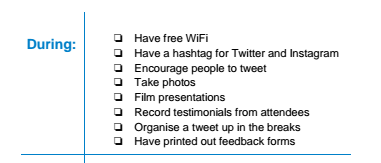
It’s a no-brainer, but make sure there is WiFi at the event – you’re sure to get questions about it, so including information about the WiFi and any passwords will be helpful.
Keep the discussion going online by answering questions that might be tweeted or responding to any requests that might come up.
Also, have your phone handy too. Take pictures at the event, record video testimonials from the attendees, and capture names wherever you’re able to so that you can connect with people after the event is over.
After The Event
Once the event has died down and you’re able to breathe again, you’ll want to start following up after the event is officially over.
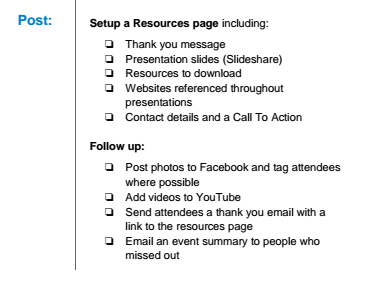
Be sure to have an event resources page set up so that you can direct attendees to any of the videos captured or presentation slides that they might download. You can also encourage attendees to save the date for next year’s event, if you know some of the details already.
Send out a thank you email as soon as possible. Include pictures from the event and direct them towards that resources page you’ve set up.
Post any pictures to Facebook and videos to Youtube – tag attendees where you can and encourage people to share these once you’ve posted them!
For anyone that couldn’t make it to the event, providing an event summary or recap will let them know what they missed out on, so they’ll be driven to purchase a ticket next time.
What Next?
Now that you’ve closed the books on your event and responded to any of the feedback that you’ve gathered, it’s time to revisit the goals that you set before you got started.
Did you meet your expectations? What requests were made during the event that you can address at your next one?
From there, you’ll be able to build on the success of your event and plan for an even bigger success the next time around.
If you’ve run an event yourself, what has worked well? Where do you think the online event promotion could improve?
Leave your tips and stories in the comments below.
Content Marketing Sales Funnel
Your content marketing sales funnel is all about getting people to know, like and trust you by nurturing them with the right information at the right time.

